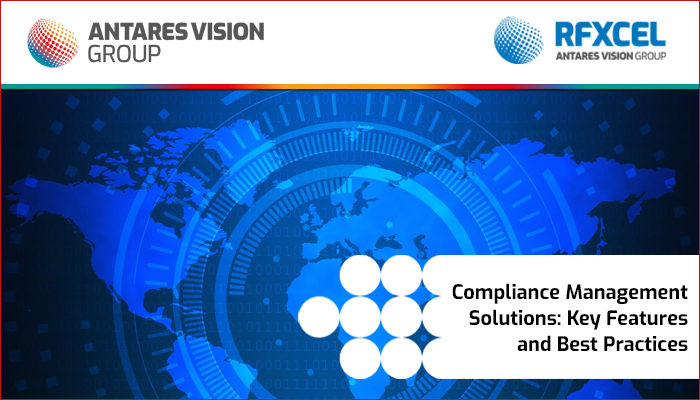Does your business have effective compliance management solutions and risk management solutions in place? In a constantly changing regulatory landscape, companies need sophisticated tools to manage their governance, risk, and compliance (GRC) efforts and reduce their risk exposure. Learn about compliance management implementation and best practices in this guide from rfxcel.
Understanding Compliance Management Solutions
Compliance management refers to the set of policies and procedures that an organization uses to ensure adherence to the laws and regulations that govern their industry. Compliance management solutions aim to:
- Identify and prevent violations
- Improve business practices
- Build and maintain consumer confidence
- Ensure ethical behavior in the industry
Compliance requirements vary by sector and country. For example, in the United States pharmaceutical companies must adhere to the Drug Supply Chain Security Act (DSCSA) and in the European Union they’re bound by the Falsified Medicines Directive (EU FMD). Food companies in the United States must comply with rules under the Food Safety Modernization Act (FSMA).
Regulatory compliance is a requirement, not a goal. Businesses that are found to be out of compliance can face harsh consequences, including corporate sanctions and government-issued fines. Plus, they run the risk of damaging their reputation and losing customers. Non-compliance can also result in costly corrective actions, such as recalling a product.
Many companies now rely on software solutions to manage and centralize their compliance efforts. Compliance software offers tracking and audit tools to ensure business practices align with applicable laws and regulations. This helps reduce manual errors and provides ongoing monitoring throughout the organization.
Benefits of Compliance Management Solutions
In addition to ensuring adherence to industry regulations and standards, effective compliance management solutions offer a range of benefits, including:
- Reduced risk: Effective management processes minimize the legal and financial risks associated with non-compliance.
- Efficiency: Compliance management software can streamline routine tasks and reduce manual processes, freeing up staff to focus on other priorities.
- Security: A good compliance solution will also have safeguards in place to protect data privacy and improve cybersecurity.
- Cost savings: A risk and compliance solution can flag risks before they cause financial implications.
Key Features of Compliance Management Solutions
If your business is in the market for a new compliance management platform, look for a solution that includes these features:
- Compliance tracking and monitoring: Your software should manage a centralized repository of the relevant regulations and requirements for your industry.
- Policy management: Compliance management solutions can help teams develop, update, and communicate standardized policies across your organization.
- Risk assessment and mitigation: Proactive identification and management of compliance risks can help companies avoid fines, fees, and sanctions.
- Data insights: Companies can review compliance activities in real time and generate compliance reports that aid in decision-making.
- Audit management: A centralized platform streamlines the audit process and can track corrective actions.
- Awareness: Compliance management tools help you manage ongoing employee training and awareness programs.
Implementing Compliance Management Solutions
Proper implementation is key when introducing compliance management software solutions. Start with a comprehensive needs assessment: What are your organizational priorities? Which regulatory requirements apply to your business? Use the findings from your assessment to guide your software selection process. Look for a compliance management platform that:
- Integrates with your existing software systems and data sources
- Can be customized to align with specific regulatory requirements
- Has a good user experience and is easy to navigate
Ideally, the software platform you choose should automate compliance processes to reduce administrative burden, saving your organization time and money.
Best Practices for Effective Compliance Management
Utilize these best practices at your enterprise to make your compliance program more effective:
- Organizational culture: Establish a culture of compliance. Plan for ongoing training to keep compliance requirements top-of-mind for staff.
- Internal audits: Conduct regular compliance assessments and gap analyses to identify areas for improvement.
- Coordination: Build a cross-functional compliance team to provide comprehensive oversight that includes stakeholders from HR, legal, and finance departments.
- Workflow management: Implement automated workflows and utilize notifications to ensure the timely completion of required compliance tasks.
Ensuring Data Security and Privacy Compliance
An important aspect of compliance management is addressing data protection regulations, which dictate how companies in a wide range of industries (e.g., healthcare and financial services) handle consumer data and personally identifiable information (PII). Data protection regulations include laws such as:
- EU General Data Protection Regulation (GDPR)
- California Consumer Privacy Act (CCPA)
- S. Health Insurance Portability and Accountability Act (HIPAA)
Companies must implement data access controls, encryption measures, and other protections to reduce the likelihood of a data breach. Additionally, if you work with third-party vendors, you need a system for setting up data-sharing agreements. Any third parties with which you contract must comply with your industry’s regulatory requirements and have adequate privacy and security protections in place.
The Future of Compliance Management Solutions
As more and more companies embrace digital transformation and implement distributed or hybrid work structures, compliance needs will continue to shift along with an evolving regulatory landscape. Additionally, newer developments in artificial intelligence (AI) and machine learning will make automated compliance monitoring more sophisticated. AI technology is already improving predictive analytics, which draws on historical data to identify patterns and make predictions that guide future business decisions.
Choose Us for Expert Compliance Management
By leveraging effective compliance management solutions, businesses can streamline their compliance processes, mitigate risks, and maintain regulatory adherence. With us, you can implement a robust compliance management system to navigate regulatory changes and help your organization work more effectively. We offer complete compliance solutions, with software that’s designed to meet the needs of specific industries including:
To get started or request pricing, contact us today.





